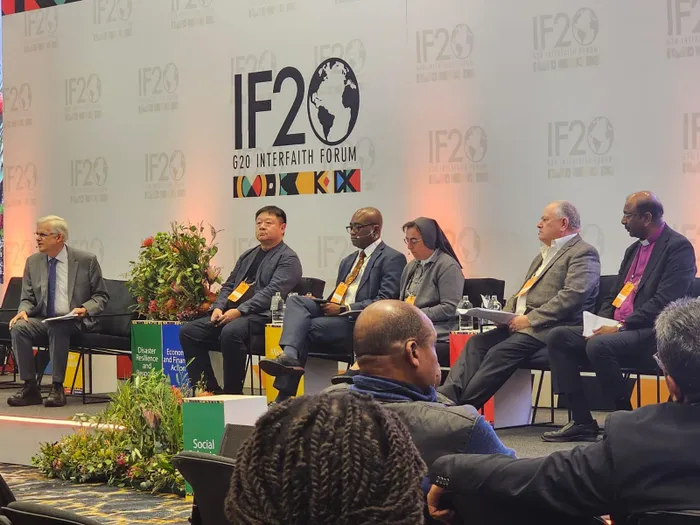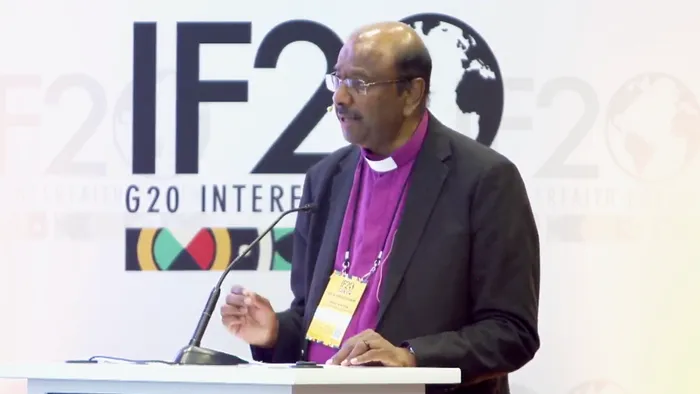Sustainability and climate change: Key discussions at the G20 Interfaith Forum

Climate change is a leading issue for the G20, with sustainability a central priority for South Africa’s G20 agenda. Wednesday's plenary at the IF20 focused on climate imperatives.
Image: Theolin Tembo/Independent Newspapers
Issues of sustainability and the roles that interfaith organisations can play in fighting and assisting to mitigate the impact of climate change took centre stage at the G20 Interfaith Forum (IF20) on Wednesday morning.
The IF20 forum convenes religious leaders, civil society organisations, government officials, multilateral institutions, and scholars to explore collaborative solutions to pressing global challenges.
The IF20 event is intended to reflect and reinforce South Africa’s G20 Presidency theme: “Solidarity, Equality, Sustainability”, but also highlight how Ubuntu can be used to tackle societal issues. The Cape Town event is intended as a catalyst for action, fostering partnerships that transcend borders, beliefs, and sectors.
General Secretary of the World Council of Churches, Rev. Prof. Dr. Jerry Pillay, started the morning’s plenary on religious responsibilities and action when it comes to sustainability.
Pillay explained that a sustainable society requires a level of human activity that is not affected by the never-ending variations of the global economy. He also highlighted that the unrestricted consumption by wealthy nations and sectors of society, and how their behaviour has adverse effects on those who are not.

General Secretary of the World Council of Churches, Rev. Prof. Dr. Jerry Pillay, started the morning’s plenary on religious responsibilities and action when it comes to sustainability.
Image: Screenshot.
“Our prevailing financial and economic thinking and systems are unsustainable and are at the root of the climate and economic crisis that threatens life on earth. The original intention of sustainability, of shaping ecological, social and economic dimensions in the interest of the future viability of all life, communities both in the north and south…has been eroded in an era of neo-liberal economic globalisation,” Pillay said.
“Sustainability cannot be achieved without equity, and equity without sustainability.”
Pillay said that Covid-19 highlighted how the issue of sustainability cannot exclude health, as the health of the planet and people matters. He added spirituality has a vital role to play in deepening sustainability.
“We need a spirituality founded on a profound understanding of our intrinsic interconnectedness in God’s household of life that motivates us to serve the common good, and a spirit of solidarity that empowers us to a radical sharing with anyone who may have need.
“Here we have a lot to learn from our indigenous brothers and sisters, and African, Asian, and other traditions, as we speak about ubuntu and other concepts.”
What followed his address was a panel discussion which, alongside Pillay, included Executive Secretary of International Network of Engaged Buddhists (INEB), Somboon Chungprampree, General Authority of The Church of Jesus Christ of Latter-day Saints, Elder Isaac K. Morrison, Director of the CDDC Trust/EFSA Institute, Dr. Renier Koegelenberg, and Secretary of the Dicastery for Promoting Integral Human Development at the Vatican City, Alessandra Smerilli.
Morrison highlighted that climate change is not a political or scientific issue, but rather a moral and spiritual one. He said it is imperative to build trust with faith leaders and communities even before disasters strike and devastate areas, as they are often the ones called up to assist.
“We need to encourage a culture of preparedness for emergencies… It is important that we teach them to set aside a small number of things that will become handy for them when there is a disaster, such as scooping a tablespoon of rice or anything you like, and put it aside in a bottle that could be used in a disaster.”
He also mentioned that those who are affected in disasters are neglected when it comes to repairing after the impact, but he said that it is “very essential that those affected become part of the healing of the whole community”.
Koegelenberg highlighted that it is tough to talk about climate justice when many people suffer from poverty, and people don’t have food, but the conflict between those agendas is a part of reality.
“If we can’t convince people in SA that the challenge of pollution and green energy is just as important for us, as (it is) in the global north, which causes most of it, then we can’t win the battle.”
theolin.tembo@inl.co.za
Related Topics: